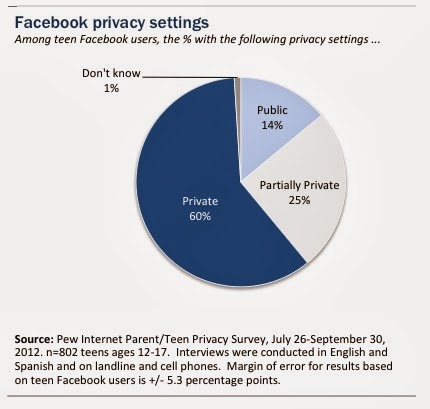I even received a memo from my school district to show and talk to my first period class about internet safety which I found ironic because this topic has been on my mind all week since I read the following presentation and article on the subject.
Teens, Social Media and Privacy: Reputation management, third party access & exposure to advertising from Pew Research Center's Internet & American Life Project and an article titled Teens, Social Media, and Privacy written by Mary Madden and Amanda Lenhart.
In these two studies they stated how teens use the internet and protect themselves in multiple ways. However, what I found intriguing was that I found myself questioning my students about the social networks they use and how they manage them. And guess what, the research held true. This is what the both the presentation and article had to say.(Oh, I also noticed that the presentation was created by both authors. What a coincidence! )
The difference between the presentation and article is that Lenhart and Madden broke down the presentation into 9 things teens do online. Which are:
1. Teens' internet use is becoming increasingly mobile.
2. Teens are diversifying their social media portfolios.
3. Teens (like adults) are sharing more info about themselves.
4. Privacy norms vary by platform.
5. Network size + composition matter in important ways.
6. For teens, managing their "social privacy" online is paramount.
7. Advertisers + other third-parties are not top of mind for teens.
8. Parents of online teens express a wide range of concerns.
9. Teens are turning to peers and parents for advice.
.
When I started reading the article my curiosity got the better of me. I started to question my students about their social network preferences.
This is what I found out :
1. The upperclassmen preferred Facebook.
2. The underclassmen like Instagram more.
3. Both liked Twitter.
Despite my research, the article went more in-depth about the topic: Teens, Social Media, and Privacy.
Lenhart and Madden writes about what teenagers share online, how they manage their privacy settings, social networks, experiences, and about their online presence.
This is what they share online:

However, interest in Facebook is slowly dissipating. Why?
1. Too many adults are now a part of the site
2. Many people are getting annoyed by shared details
3. DRAMA
Twitter and Instagram are BETTER! WHY?
1. Better express themselves
2. Free from social expectations/constraints
In high school it is about the façade, the reputation one has. Teenagers' social lives are everything.
So this occurs:
- 59% deleted or edited something they posted
- 53% deleted comments from others
- 45% removed their names from photos
- 31% deleted or deactivated an entire profile
- 19% posted updates, comments, photos, or videos that they later regretted sharing
Even some teenagers write in code, post false information, and joke.
Here are some reasons why some are careful about their online presence.
Whatever they post online mirrors their experience using these sites.
I really enjoyed this article/presentation because it revealed the teenager perspective of social networking and showed me not to judge a book by its cover. Not one is the same.
Lenhart, A. & Madden, M. (2013). 9 Things You Need To Know About Teens, Technology, & Online Privacy . Retrieved November 29, 2013 from, http://www.pewinternet.org/Presentations/2013/Nov/9-Things-About-Teens-Technology-Online-Privacy.aspx.
Lenhart, A. & Madden, M. (2013). Teens, Social Media, and Privacy. Retrieved November 29, 2013 from,
http://www.pewinternet.org/Reports/2013/Teens-Social-Media-And-Privacy/Summary-of-Findings.aspx.
Presentation: 12 slides
Article: 107 pages








No comments:
Post a Comment